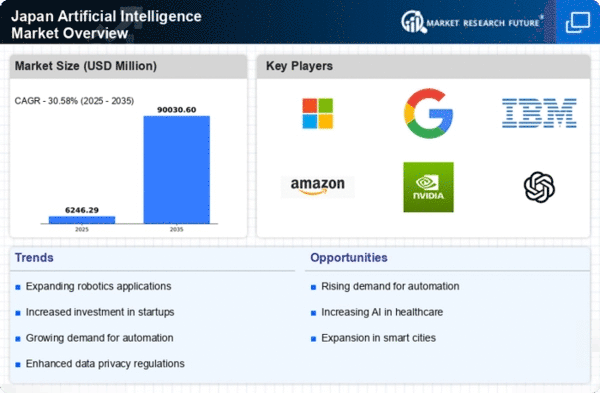Rising Demand for AI Talent
There is a notable surge in demand for skilled professionals in artificial intelligence in Japan. As companies increasingly adopt AI technologies, the need for data scientists, machine learning engineers, and AI specialists has escalated. Reports indicate that the AI workforce in Japan is projected to grow by approximately 30% over the next five years. This growing talent pool is essential for driving innovation and enhancing the capabilities of AI applications across various sectors. Furthermore, educational institutions are responding by developing specialized programs to equip students with the necessary skills, thereby contributing to the overall growth of the artificial intelligence market. The competition for top talent is likely to intensify, which may lead to higher salaries and better job opportunities in the sector.
Government Initiatives and Support
The Japanese government is actively promoting the development of the artificial intelligence market through various initiatives and funding programs. In recent years, substantial investments have been allocated to AI research and development, with the aim of positioning Japan as a leader in AI technology. For instance, the government has set a target to increase AI-related investments to ¥1 trillion by 2025. This support not only fosters innovation but also encourages collaboration between public and private sectors, enhancing the overall ecosystem for AI development. Additionally, regulatory frameworks are being established to ensure ethical AI usage, which is crucial for building public trust and acceptance. Such government backing is likely to accelerate the growth trajectory of the artificial intelligence market in Japan.
Expansion of AI Applications in Retail
The retail sector in Japan is witnessing a significant expansion, where AI technologies are being integrated to enhance customer experiences and operational efficiency. Retailers are increasingly utilizing AI for personalized marketing, inventory management, and customer service automation. For example, AI-driven chatbots are becoming commonplace, providing 24/7 customer support and improving engagement. Market data suggests that the adoption of AI in retail could lead to a 20% increase in sales efficiency by 2026. This trend indicates a shift towards data-driven decision-making, allowing retailers to better understand consumer behavior and preferences. As a result, the artificial intelligence market is likely to see sustained growth as more retailers embrace these technologies.
AI-Driven Innovations in Transportation
The transportation sector in Japan is undergoing a transformation, largely driven by advancements in the artificial intelligence market. AI technologies are being employed to enhance traffic management, optimize logistics, and develop autonomous vehicles. The Japanese government has set ambitious goals for the deployment of self-driving cars, aiming for widespread adoption by 2030. This initiative is expected to create a substantial market for AI solutions, with estimates suggesting that the autonomous vehicle market alone could reach ¥2 trillion by 2030. Furthermore, AI is being utilized to improve public transportation systems, making them more efficient and user-friendly. The integration of AI in transportation is likely to reshape the industry, presenting new opportunities for growth within the artificial intelligence market.
Increased Focus on AI Ethics and Regulation
As the artificial intelligence market in Japan continues to expand, there is a growing emphasis on ethical considerations and regulatory frameworks surrounding AI technologies. Stakeholders, including businesses and government entities, are recognizing the importance of addressing ethical concerns related to data privacy, algorithmic bias, and accountability. In response, initiatives are being developed to establish guidelines and best practices for responsible AI usage. This focus on ethics is crucial for fostering public trust and ensuring the sustainable growth of the artificial intelligence market. Moreover, regulatory measures may evolve to address emerging challenges, potentially influencing how AI technologies are developed and implemented. The proactive approach to AI ethics and regulation is likely to shape the future landscape of the artificial intelligence market in Japan.
















